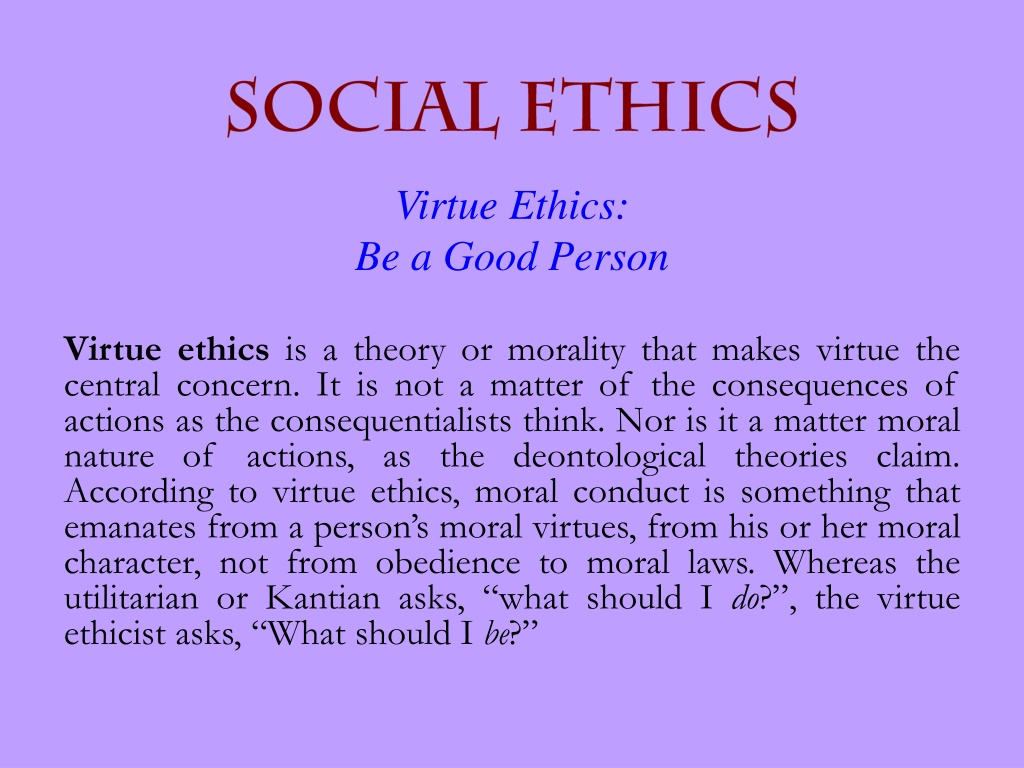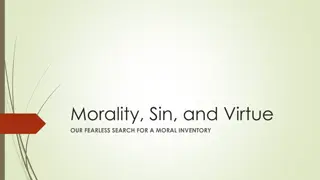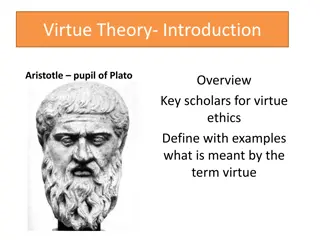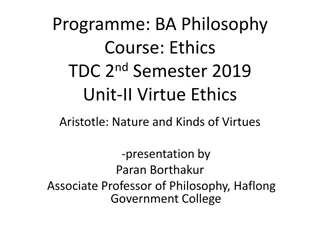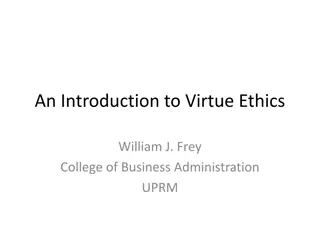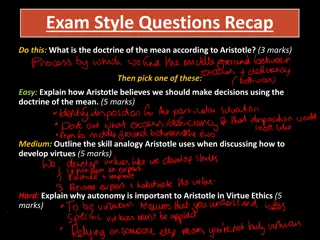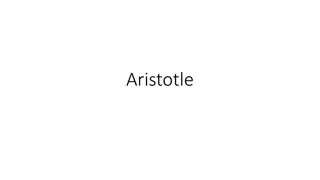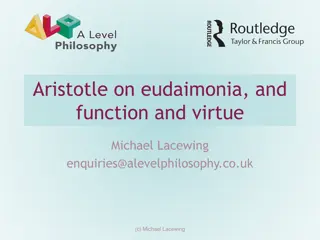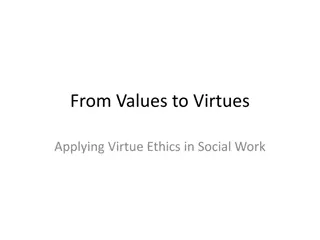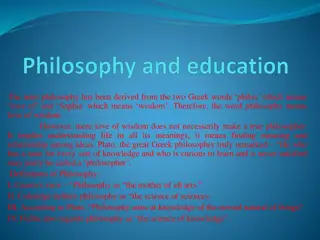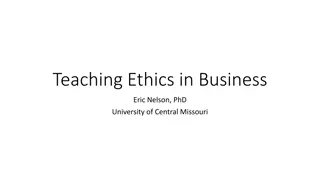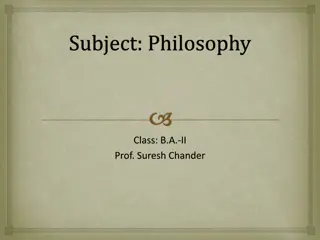Understanding Virtue Ethics in Aristotle's Philosophy
Virtue ethics places virtue at the center of morality, emphasizing moral character over obeying laws or focusing on consequences. Aristotle's influence on virtue ethics is significant, highlighting the importance of striving to be a virtuous person whose actions stem from a virtuous character. According to Aristotle, human existence aims towards an ultimate purpose, with the highest goal being to achieve eudaimonia (happiness) through living in accordance with reason and developing virtuous traits.
Download Presentation

Please find below an Image/Link to download the presentation.
The content on the website is provided AS IS for your information and personal use only. It may not be sold, licensed, or shared on other websites without obtaining consent from the author. Download presentation by click this link. If you encounter any issues during the download, it is possible that the publisher has removed the file from their server.
E N D
Presentation Transcript
Virtue Ethics: Be a Good Person Virtue ethics is a theory or morality that makes virtue the central concern. It is not a matter of the consequences of actions as the consequentialists think. Nor is it a matter moral nature of actions, as the deontological theories claim. According to virtue ethics, moral conduct is something that emanates from a person s moral virtues, from his or her moral character, not from obedience to moral laws. Whereas the utilitarian or Kantian asks, what should I do? , the virtue ethicist asks, What should I be?
Virtue Ethics Aristotle s philosophy was influential, as we saw last week, in the development of natural law theory; but his most significant influence in moral theory is with virtue ethics. Aristotle thought the moral life consists not in following moral rules that stipulate right actions, but in striving to be a particular kind of person a virtuous person whose actions stem naturally from virtuous character. Aristotle (384 322 BC)
Virtue Ethics Recall that Aristotle had a teleological view of nature. Everything is developing toward some end or purpose. Every living being has an end toward which it naturally aims. Human existence also has an end or ultimate purpose, according to Aristotle, and the highest end of human actions is to bring about this end, the best good of human existence. Suppose, then, that (a) there is some end ( ) of the things we pursue in our actions which we wish for because of itself; and (b) we do not choose everything because of something else, since (c) if we do, it will go on without limit, making desire empty and futile; then clearly (d) this end ( ) will be the good, i.e., the best good. Then surely knowledge of this good is also of great importance for the conduct of our lives, and if, like archers, we have a target to aim at, we are more likely to hit the right mark. Aristotle (384 322 BC)
Virtue Ethics Natural law theorists used Aristotle s teleological view to support the view that some actions are morally right in and of themselves because they are in accord with the way nature is. Aristotle s ethics did not go in this direction, but instead emphasized the virtuous character traits that would lead to the fulfillment of the true goal of human existence. This end or goal ( ), the ultimate good of human existence, Aristotle defined as: Eudamonia Happiness Human Flourishing Aristotle (384 322 BC)
Virtue Ethics To achieve eudamonia, Aristotle thought human beings must fulfill the function that is natural and distinctive to them. Aristotle defined humans as the rational animal, and thus, the natural function of human beings is to live in accordance with reason. The life of reason entails a life of virtue because the virtues themselves are rational modes of behaving. Thus, according to Aristotle, Happiness (eudamonia) is an activity of the soul in accordance with complete or perfect virtue. What, then, is perfect virtue? Aristotle (384 322 BC)
Virtue Ethics A virtue is a stable disposition to act and feel according to some ideal or model of excellence. It is a deeply embedded character trait that can affect actions in countless situations. Aristotle distinguished between intellectual virtues and moral virtues. The intellectual virtues include wisdom, prudence, rationality. The moral virtues include fairness, benevolence, honesty, loyalty, conscientiousness, and courage. Aristotle (384 322 BC) Aristotle thought the intellectual virtues can be taught, but the moral virtues require practice, and thus, are the result of good habits.
Virtue Ethics Aristotle s notion of a moral virtue is what he calls the GoldenMean, a balance between two behavioral extremes. Deficit Cowardice Stinginess Slothfulness Humility Secrecy Moroseness Quarrelsomeness Friendship Self-indulgence Temperance Apathy Composure Indecisiveness Self-Control Impulsiveness Golden Mean Courage Generosity Ambition Modesty Honesty Good Humor Excess Rashness Extravagance Greed Pride Loquacity Absurdity Flattery Insensibility Irritability Aristotle (384 322 BC)
Virtue Ethics Modern virtue ethics is deeply influenced by Aristotle s thought, though some virtue ethicists don t accept his teleological view of human nature and some question his concept of virtue as a mean between extremes. Like Aristotle, contemporary thinkers put the emphasis on quality of character and virtues, rather than on particular principles or rules of right action. Virtue ethicists, for example, are less likely to ask whether lying is wrong in a particular situation than whether an action or person is honest or dishonest. Virtue ethicists agree with Aristotle in arguing that a pure duty-based morality of rule adherence represents a barren, one- dimensional conception of the moral life.
Virtue Ethics Contemporary virtue ethics was greatly influenced by the book After Virtue (1981), widely recognized as one of the most important works of moral and political philosophy of the 20th century. Alisdair MacIntyre (1929- )
Virtue Ethics Modern virtue ethicists agree with Aristotle on two main points: 1) The cultivation of virtues is not merely a moral requirement it is a way (some would say the only way) to ensure human flourishing and the good life. .
Virtue Ethics 2) Ethics must take into account motives, feelings, intentions, and moral wisdom factors that duty-based morality neglects. According to Kant, the only thing that matters in determining the moral worth of actions is whether one does it from a recognition that it is one s duty to do it. We don t need to consider our motives and feelings. In virtue ethics, acting from such motivations as friendship, loyalty, kindness, love, or sympathy is a crucial part of acting from a virtuous character.
Virtue Ethics Virtue in Action If moral rules are secondary in virtue ethics, how does a virtue ethicist make moral decisions? In considering whether or not to tell a lie, a virtue ethicist thinks, not about the consequences of the action, nor the moral rightness of the action, but rather the impact of the action upon her character. If honesty is a virtue, then she will do her best to act honestly and avoid lying. Virtue ethicists often look to role models, people who embody the virtues and have inspired others with their virtuous conduct. Through practice in following the role model, and developing good habits, the virtuous person develops a character that spontaneously does what is good.
Virtue Ethics Evaluating Virtue Ethics Some philosophers think that virtue ethics seems to explain important aspects of the moral life. It seems to offer a more plausible explanation of the role of motivation in moral actions than duty-based ethics. Some philosophers also defend virtue ethics in pointing out that the aims of being a good person and living a good life of happiness or human flourishing are obviously central to the moral life and should be part of any adequate theory of morality.
Virtue Ethics Evaluating Virtue Ethics Virtue ethics seems to meet the minimum requirement of coherence, and it appears to be generally consistent with our commonsense moral judgments and moral experience. The main problem with virtue ethics is that it seems, say the critics, that it is difficult to put into practice. (Criterion 3) If it doesn t provide any principles of action it cannot give us any useful guidance in deciding what to do.
Virtue Ethics Evaluating Virtue Ethics In any given situation, the advice of virtue ethics is to do what a virtuous person would do. But what exactly would a virtuous person do in this particular situation? It is often not clear. As many philosophers see it, the problem is that virtue ethics says that the right action is the one performed by the virtuous person and that the virtuous person is the one who performs the right action. This is to argue in a circle and thus gives no help in determining what one should do.
Virtue Ethics Evaluating Virtue Ethics Some also argue that a person may possess all the proper virtues but still be unable to tell right from wrong. Dr. Green may be benevolent and just and still not know if stem cell research should be continued or stopped, or if he should help a terminal patient commit suicide, or if he should perform a late-term abortion. It is also possible that a virtuous person, a person who at least thinks they are practicing virtues, could commit an immoral act. Are there standards or morality that are independent of character traits?
Virtue Ethics Evaluating Virtue Ethics A virtue ethicist can respond to these criticisms by asserting that there is plenty of moral guidance to be had in statements about virtues and vices.. Virtue ethicist Rosalind Hursthouse thinks that we can discover our moral duties by examining terms that refer to virtues and vices, because moral guidance is implicit in these terms.
Virtue Ethics Evaluating Virtue Ethics Another criticism regarding the usefulness of virtue ethics focuses on the possibility of conflicts of virtues. Sometimes a situation may involve a conflict, where one could be loyal but dishonest, or honest but disloyal. Virtue ethics doesn t provide a way to resolve such conflicts. Defenders of virtue ethics respond by saying the same problem is not a fatal flaw in duty-based ethics, so it should not be enough to dismiss virtue ethics either.
The Ethics of Care Another approach to morality that is associated with virtue ethics is the ethics of care. This ethics focuses on close personal relationships and moral virtues such as compassion, love, and sympathy. Some think of the ethics of care as a full-fledged moral theory in its own right and others see it as a version of virtue ethics. This approach to ethics was sparked by research done by psychologist Carol Gilligan on how men and women think about moral problems. Carol Gilligan (1936- )
The Ethics of Care In Gilligan s influential book, In a Different Voice, she argued that men and women think in radically different ways when making moral decisions. Men deliberate about rights, justice, and rules; while women focus relationships, caring for others, and being aware of people s feelings, needs, and viewpoints. She dubbed these two approaches the ethic of justice and the ethic of care. on personal
The Ethics of Care Recent research has raised doubts about Gilligan s thesis that there is a significant difference between the moral thinking styles of men and women. But this doesn t invalidate the relevance of caring for ethics. If virtues are a part of the moral life, and if caring is a virtue, then there must be a place for caring alongside the principles of conduct. Annette C. Baier, an early proponent of the ethics of care, makes a case for both care and justice: It is clear, I think, that the best moral theory has to be a cooperative product of women and men, has to harmonize justice and care. The morality it theorizes about is after all for all persons, for men and women, and will need their combined insights.
Feminist Ethics The ethics of care is an example of feminist ethics, which is not a moral theory so much as an alternative way of looking at the concepts and concerns of the moral life. Feminists are a diverse group; nevertheless, some generalizations of a feminist approach to ethics are: 1) 2) 3) 4) An emphasis on personal relationships A suspicion of moral principles The rejection of impartiality A greater respect for emotions
Virtue Ethics Learning from Virtue Ethics The reason that virtue ethics has enjoyed a revival in recent years is because it is sustained by an important ethical truth: virtue and character are large, unavoidable constituents of our moral experience. The undeniable significance of virtue in morality has obliged many philosophers to consider how best to accommodate virtues into their principle-based theories of morality or to recast those theories entirely to give virtues a larger role.
Virtue Ethics Learning from Virtue Ethics The rise of virtue ethics has also forced many thinkers to reexamine the place of principles in morality. Are virtues or principles more important? Philosopher William Frankena emphasizes both are necessary: principles without traits [virtues] are impotent and traits without principles are blind.
